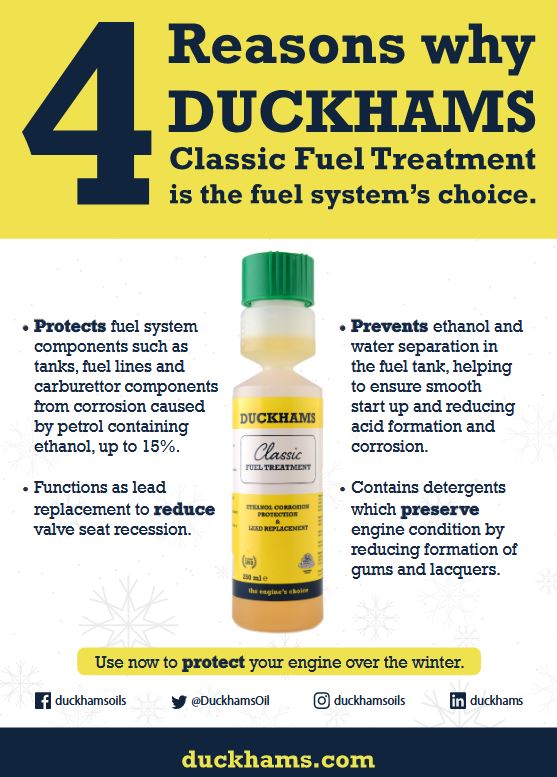It’s Not Only Wildlife that Needs to Prepare for Winter Hibernation

Published: 19/11/2019
As autumn draws to an end and the days get shorter, many wild animals are preparing to hibernate through the winter.
Classic Car owners are also thinking of laying up their cherished vehicles for the long winter months, to protect them from exposure to the elements and harsh chemicals thrown up by the road.
When laying up vehicles classic owners think of protecting the exterior, bodywork and chassis, but how many think about protecting the engines and fuel systems of their vehicles?
Here at Duckhams we know that carefully planned storage will protect the engine of your vehicle and ensure that when you return to the road in the spring, your engine will be ready for the new Classic season.
When engine oils are worked, they generate acidic oxidation products, and leaving this dirty, used oil in your engine over the winter lay-up period will leave the internal surfaces exposed to potentially harmful corrosion. Also, the oil can form deposit precursors which can form sludges and drop out of the oil during storage.
Also, most of us will be aware that the government has introduced legislation requiring oil companies to include an element of renewable fuel, in the form of ethanol, into the petrol we buy to reduce the environmental impact of producing the fuel. Since September, forecourts have been required to display the maximum ethanol content in the petrol, these are the new E5 stickers which have appeared on petrol pumps.
However, ethanol is a hygroscopic chemical, meaning it absorbs water from the atmosphere. When standing for a long period of time, enough water can build up in the petrol to separate into an acidic ethanol and water layer at the bottom of the fuel tank which can corrode the fuel system and be drawn into the engine cylinders when starting up after the winter, potentially causing damage.
To protect your car, Duckhams advises that you take some basic, proactive steps to prepare it for winter storage. It is strongly recommended that as part of this preparation you always consider changing the used engine oil to a fresh charge of a quality engine lubricant, such as Duckhams Classic Q 20W-50, and that you then run the engine briefly to ensure that all the components are coated with fresh oil before laying your vehicle up for the winter.
To protect the fuel system, we would advise storing the vehicle with a full tank of quality fuel, with an ethanol corrosion inhibitor, such as Duckhams Classic Fuel Treatment, added. Filling the tank reduces the headspace above the fuel, and so minimises the amount of water that can be absorbed from the air. Duckhams Classic Fuel Treatment contains ethanol stabilisers and so will prevent the water dropping out to form a water layer. It also contains corrosion inhibitor additives to protect the fuel system from corrosion.
Whilst some fluids benefit from being changed before storage, other fluids, such as brake and clutch fluids will deteriorate over the winter months, absorbing moisture from the air, while the contents of the opened bottle will also deteriorate on standing. It is better to change these fluids just before returning the vehicle to the road, so we would recommend draining the brake and clutch system and replacing with a good hydraulic fluid, such as Duckhams Classic Brake and Clutch Fluid after winter storage.
Following these steps should ensure that in spring when you return to the road, not only will it still look pristine but your classic’s engine will be lean and ready for the road -just like the creatures of the wild…











